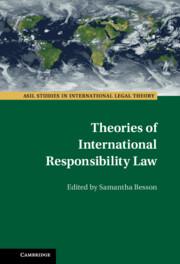Book contents
- Theories of International Responsibility Law
- ASIL Studies in International Legal Theory
- Theories of International Responsibility Law
- Copyright page
- Contents
- Contributors
- Preface
- Theorizing International Responsibility Law, an Introduction
- Part I International Responsibility of Public Institutions: Public and/or Private?
- Part II International Responsibility of Public Institutions: Collective and/or Individual?
- 5 Responsibility as Opportunism
- 6 Responsibility of Members of an International Organization
- 7 International Responsibility for Global Environmental Harm
- 8 Justifying Liability for State Remedial Duties
- Part III International Responsibility of Public Institutions: Fault-based or Not?
- Part IV Responsibility of Public Institutions: A World Tour
- Index
7 - International Responsibility for Global Environmental Harm
Collective and Individual
from Part II - International Responsibility of Public Institutions: Collective and/or Individual?
Published online by Cambridge University Press: 01 September 2022
- Theories of International Responsibility Law
- ASIL Studies in International Legal Theory
- Theories of International Responsibility Law
- Copyright page
- Contents
- Contributors
- Preface
- Theorizing International Responsibility Law, an Introduction
- Part I International Responsibility of Public Institutions: Public and/or Private?
- Part II International Responsibility of Public Institutions: Collective and/or Individual?
- 5 Responsibility as Opportunism
- 6 Responsibility of Members of an International Organization
- 7 International Responsibility for Global Environmental Harm
- 8 Justifying Liability for State Remedial Duties
- Part III International Responsibility of Public Institutions: Fault-based or Not?
- Part IV Responsibility of Public Institutions: A World Tour
- Index
Summary
There are important doctrinal and institutional obstacles in the way of proper treatment of collective legal responsibility of several States for global environmental harm, but no serious theoretical obstacles. Difficult theoretical issues do arise at the level of justification, however. The chapter investigates how legal and moral responsibility of individuals, States, and collectives of both all fit together as a normative matter, using global environmental harm as its case study. It argues that shared moral responsibility – the responsibility an individual has when acting together with others – is a very important moral phenomenon. By contrast we have no need for the idea of a collective (such as a State) itself being morally responsible. Ideally, the shared ex ante moral responsibilities of individuals together to reduce greenhouse gas emissions would be discharged by domestic law under the guidance of international law. Where non-complying States face sanctions, the burden of those sanctions will be imposed on individuals who are not responsible for their State’s failure. Yet citizens have political obligations to improve their States, including in the matter of compliance with international law. If the sanctions can be seen as doing citizens’ work for them, the burdens imposed do not seem objectionable.
Keywords
- Type
- Chapter
- Information
- Theories of International Responsibility Law , pp. 165 - 186Publisher: Cambridge University PressPrint publication year: 2022
- 1
- Cited by



